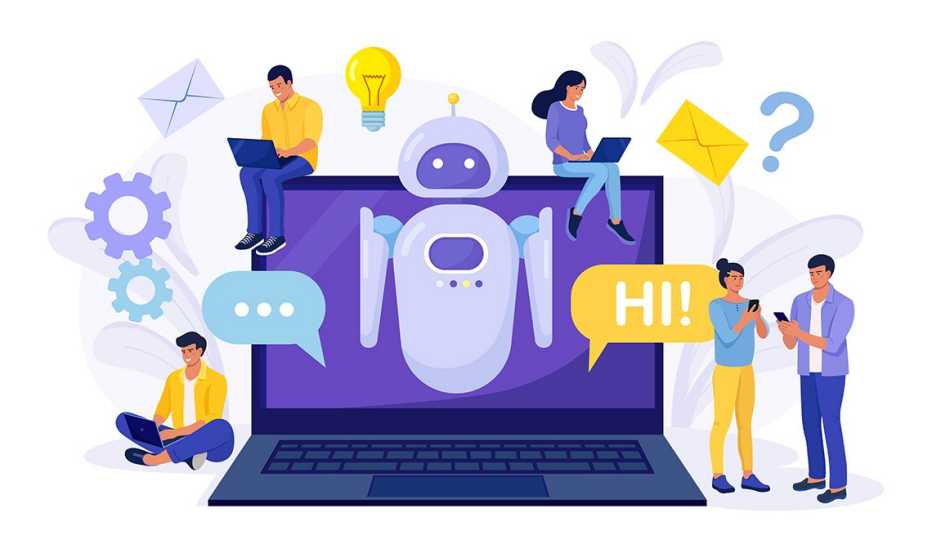Staying Fit


After decades of being the subject of science fiction, artificial intelligence — which uses computer science and large amounts of data to perform tasks, solve problems and communicate — is becoming mainstream. Among other uses, the technology can be found in many workplace tools, ranging from human resources tools and accounting software to customer service and marketing platforms.
Since the launch of the AI tool ChatGPT in November 2022, widespread curiosity has emerged about the potential of generative AI, which is AI that can create text, images and other media components upon request. Because it’s essentially a chatbot, ChatGPT can seemingly carry on conversations, answering basic requests (a recipe for chicken soup) to more complex assignments (a short essay on your favorite book).


AARP Membership— $12 for your first year when you sign up for Automatic Renewal
Get instant access to members-only products and hundreds of discounts, a free second membership, and a subscription to AARP the Magazine.
But for job seekers, especially those age 50 and older, these tools may offer help in landing that next gig. Older applicants often encounter age bias in the hiring process, either because they are not considered tech-savvy by recruiters or because the technologies that screen resumes filter out resumes that don’t include the keywords the employer is seeking.
While ChatGPT and similar technologies are new, there are signs that these tools can offer a boost to applicants who use them. A recent survey by ResumeBuilder found that nearly half of respondents (46 percent) said they used ChatGPT to write their resumes or cover letters for them. Of those, three in four (78 percent) got an interview when using ChatGPT to write application materials for them, according to the research.
If the thought of learning another technology platform sounds off-putting, rest assured that many AI platforms are user-friendly, says career expert Amanda Augustine. Referring specifically to ChatGPT, she says, “The platform is so easy, so intuitive. You shouldn’t be intimidated by this technology, because it’s actually very easy to use.”
Some AI-powered tools are very specific in their purpose, while others can answer a wide range of questions and even generate documents and images. They can help you gather information, track your job search progress, put your best foot forward and prepare for the interview process in a variety of ways.
But it’s important to remember that the tools are just that — tools, says Ryan Miller, director of client success at Employment BOOST, a resume-writing and career coaching firm. “We characterize tools like ChatGPT as a very, very good supplement to the job search,” he says. “But, at the end of the day, you still have to show up and prepare effectively, represent yourself and market yourself well.”
Here are five ways the tools can help older adults in their job search.
1. AI can find, optimize and manage job opportunities
Many job-search platforms use AI to help you find opportunities and ensure that you’re using the right keywords and phrases for them. Tools like Talentprise and Talentpair use AI to analyze your resume and suggest relevant job opportunities, while others, like Jobscan, use AI to help you optimize your resume to get past automated applicant tracking systems used by many companies to select candidates for interviews. Such tools can help you find opportunities, then ensure you have the right keywords and skills highlighted.Remote job coach Jordan Carroll, author of Remote for Life: How to Find a Flexible Job and Fast Forward to Freedom, says tools like Teal can help track job opportunities and applications, as well as help you build your resume with the right keywords. “This is the one of the first steps that we can really use AI to help us because you can plug job descriptions into something like ChatGPT or Teal, which will give you lists of keywords,” Carroll says.




































































More From AARP
Chatbots and Voice-Cloning Fuel Rise in AI-Powered Scams
Cybercrime experts warn that new tech offers scammers frighteningly effective tools
Everything You Need to Know About ChatGPT, and Why It Matters
AI bot can find answers, or make things up, in a second
6 Ways Artificial Intelligence Can Change Your Life for the Better
AI is here — and providing improved medical outcomes for veterans